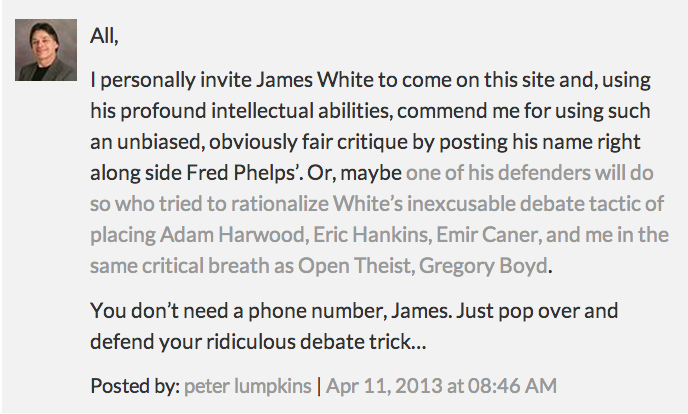Last week I replied, briefly, to Eric Svendsen’s comments on particular redemption/limited atonement. My 1000 word response garnered a pretty quick response over three times that length that ended with, “I did not address every point in those articles since my intent for the blog entry was merely to clarify my own position, not take on Alpha and Omega Ministries : ) ” Well, I’m hoping the smiley face communicates the fact that Eric really isn’t “taking on” anyone, but that we are having a conversation about an important point, only via our blogs.
I do not know about Dr. Svendsen’s schedule, but I begin teaching a Jan term class for GGBTS next week, so I know that the 1000 words–>3,300 words–>6,700 words–>12,000 words–>something certain verbose RC apologists would start to notice routine won’t work for me. So I will keep this “blog sized.” And there is another reason why I need to do so: I honestly have not encountered Dr. Svendsen’s position before, at least not as he is defining it. Hence, while my position is a known element, I cannot assume anything regarding his. That means I run the danger of speculation, which is poison to any meaningful discussion.
In his last response Dr. Svendsen wrote the following:
Okay, let’s take this a point at a time. First of all, I do not see any necessary dependence between (1a) the unconditional choice of God’s elect and his effectual drawing of them, and (2a) the extent of Christ’s atoning work on the cross. Christ can (2b) die to pay for the sins of his elect and (by virtue of the immeasurable and eternal value of that death) incidentally pay for the sins of the entire world in the process, AND (1b) unconditionally elect and draw his chosen ones to himself without doing the same for the non-elect. What, pray tell, is inconsistent about that?
This caught my attention more than anything else. In essence, I do not see how there is consistency of purpose in the viewpoint being expressed here. I see a very strong connection and dependence between the intention of the Trinity in the salvation of the elect and the work of the High Priest in behalf of His people. This is one of the major issues, as I see it, for I believe we could examine the Hebrews texts and establish that the perfect High Priest will not fail to do as the old high priests did in offering before the throne the blood of the same sacrifice offered upon the altar: that is, the scope of intercession and that of offering were the same for the high priest of old. How can the perfect High Priest offer a substitutionary sacrifice that “incidentally” pays the sins of the non-elect and then not offer that same blood which paid the penalty of their sin before the altar (intercession)? This speaks to the issue at hand: I honestly do not understand, and have honestly never seen in my reading, the use of the term “incidentally” in regards to the payment of the sin debt. So my first question basically is, “How does one bring about forgiveness of sins without substitution?” I would assume Eric would not say the non-elect are joined to Christ in any way. So, if atonement involves substitution, and the non-elect are not joined to Christ, then how are their sins “incidentally” paid for by Christ’s death?
Now, Dr. Svendsen speaks of the “virtue of the immeasurable and eternal value” of the death of Christ as the reason why all men thereby have the penalty of their sins paid. But recognition of unlimited value does not necessitate the conclusion that the non-elect’s sins have been paid. Likewise, recognition that the benefits of that atonement are experienced in time by the elect does not mean that they were not truly and specifically and personally united with Christ in His death: the certainty of the application is beyond question due to the cross: we simply experience that application in time. It was not God’s intention that the non-elect experience the redemptive, substitutionary benefits of the death of Christ, incidentally or otherwise, and this is why their trespasses can be held against them (2 Cor. 5:19).
So in essence, since this seems to be the main difference between us, I would ask Dr. Svendsen to look at my presentation on the issue of atonement/intercession as works of the High Priest in The Potter’s Freedom, pp. 241ff, and in particular, the comments on the text of Hebrews offered there, and explain where I have erred to believe that the scope of the High Priest’s intercession is identical to the scope of His sacrificial offering. Secondly, I would like to know how, in light of the fact that Dr. Svendsen accepts the concept of substitutionary atonement, the non-elect can be considered to have been united with Christ in His death. And, of course, I hope the readers will find the conversation useful and beneficial.




